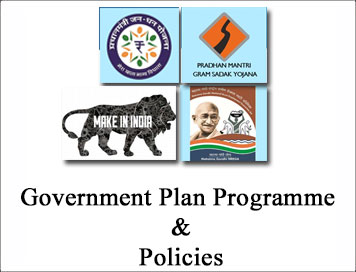National Mineral Exploration Policy: Government Plan Programme Policies for UPSC Exam

Government Plan Programme Policies for UPSC Exam
:: National Mineral Exploration Policy ::
The Union Government has unveiled National Mineral Exploration Policy (NMEP), 2016 for adaptation of comprehensive exploration of non-fuel and non-coal mineral resources. The Mining industry in India is a major economic activity which contributes significantly to the economy of India. It contributes more than 10 % of the total industrial activity. Along with major economic contributor, this sector is also a major sector with respect job opportunities. Indian mining industry provides job opportunities to around 700,000 individuals. Fisrt national mining policy in India came after 1993. National mining policy of 1993 along with the economic reforms of 1991 helped the growth of the mining sector. Mining policies have changed with time in India. Government came up with National Mineral Policy (NMP) in 2008. It changed the way government involves itself in the mining sector. As far as survey and exploration are concerned, NMP 2008 stated that Government agencies would continue to perform the tasks assigned to them for exploration and survey.
National Mineral Exploration Policy (NMEP) prescribes for incentivising the participation of private companies in exploration. Under NMEP, private agencies would be engaged to carry out exploration with the right to a certain share in the revenue (by way of royalty/premium to be accruing to the state government) from the successful bidder of mineral block after e-auction, which will be discovered by that private explorer. The revenue sharing could be either in the form of a lump sum or an annuity, to be paid throughout the period of mining lease, with transferable rights.
Government will also work out normative cost of exploration works for different kinds of minerals so that the exploration agencies could be compensated, in case they could not discover any mineable reserves in their respective areas. This will be an added incentive for exploration agencies to mitigate their risk of exploration.
Other Salient features of this policy are given below:
- The selection of private explorer is proposed to be done following a transparent process of competitive bidding.
- Acquisition, processing and interpretation of pre-competitive baseline geoscience data play a pivotal role in successful exploration process. In this regard, the NMEP proposes the following:
- The pre-competitive baseline geoscientific data will be created as a public good and will be fully available for open dissemination free of charge.
- A National Aero-geophysical Mapping program will be launched to map the entire country. It will help to delineate the deep-seated and concealed mineral deposits.
- National Geoscience Data Repository (NGDR) will be set up.
- Government will coordinate and collaborate with scientific and research bodies, universities and industry for the scientific and technological research to address the mineral exploration challenges in the country.
- For this, the Government proposes to establish a not-for-profit autonomous body/ company that will be known as the National Centre for Mineral Targeting (NCMT).
- State Governments have a key role in building up a steady stream of auctionable prospects.
- NMEP proposes to launch a special initiative to probe deep-seated/concealed mineral deposits in the country on the lines of UNCOVER project of Australia.
- SBI Capital Markets Ltd (SBICAP) has been selected as consultant by the Ministry of Mines for development of detailed modalities of contractual framework for mineral exploration.
- The Ministry will provide handholding support to the State Governments in this process of engaging the private agencies.

